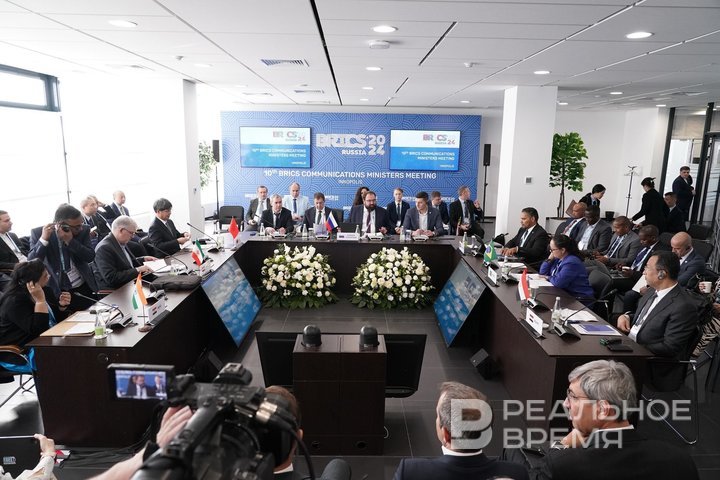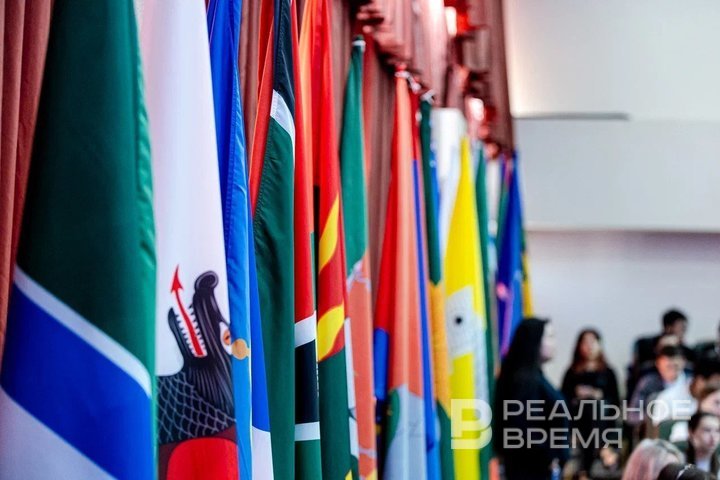Russia sets an example in artificial intelligence development and Tatarstan does in peacefulness

Four main areas were discussed at the Meeting of BRICS Communications Ministers on 27 September, including the development of artificial intelligence, increasing the digital competencies of citizens, developing digital platforms and ensuring cybersecurity. Russia, for example, is succeeding in this regard in the development of AI, China is in the electronics industry and Brazil –in education. Read about what the host country learnt from the meeting and what strengths Tatarstan found are in a report of Realnoe Vremya.
“Countries that do not develop AI have a restricted pace of development”
The 10thMeeting of BRICS Communications Ministers was held in Innopolis. Delegations from six countries came to the event — South Africa, India, China, Brazil, Iran and Egypt. Head of the Russian ministry Maksut Shadayev opened the forum.
“Our meeting is a great opportunity to discuss how our countries can jointly promote innovations in the field of digital technologies, how we can develop our partnership, exchange experiences in order to build a global digital economy,” he said.
Shadayev also outlined the main points that were included in the agenda of the meeting. These include the development of artificial intelligence, increasing the digital competencies of citizens, developing digital platforms and ensuring cybersecurity.
“Artificial intelligence is the main challenge. There is a lot of competition now. Obviously, countries that own the technology have a competitive advantage. Others will be severely limited in the pace of development. We discussed how to unite the efforts of the BRICS countries around the development of AI, on the one hand. On the other hand, we discussed the risks associated with its widespread development and implementation. How to guarantee the protection of human rights and freedoms? How to ensure that AI does not cause harm?” Shadayev told Realnoe Vremya.

Following the event, the communications ministers adopted a declaration that reflected the key principles, common approaches and areas of cooperation.
“The countries see many things in the same way, the priorities are agreed upon,” the minister said in a conversation with the newspaper’s correspondent.
“Iran and China are showing particular interest in cooperation”
Answering a question from Realnoe Vremya’s correspondent, Shadayev singled out China, Brazil and Iran as the strongest countries in digitalisation whose experience should be taken into account when developing the sphere.
“China is mass production, the electronics industry. Colleagues demonstrate very good results here,” he said. “Of course, we need to develop such production at home. Also artificial intelligence. In this aspect, there is something to discuss with China and Brazil.”
As for Iran, it is worth paying attention to the development of digitalisation in the context of external restrictions:
“We can learn from Iran how to live in conditions of restrictions. Colleagues have much more experience of such a life, when countries try to make access to advanced technologies and developments as difficult as possible. Iran shows that if there is a will, then development cannot be stopped.”

Moreover, according to Deputy Prime Minister of Tatarstan Roman Shaykhutdinov, Iran and China are demonstrating a special interest in mutual cooperation with Russia.
“Iran and China are showing a special interest in mutual cooperation. They are also trying to find different meanings and points for interaction. Plus, these countries are interested in developing technologies and their joint use,” he said.

Tatarstan Digitalisation Minister Ayrat Khayrullin also singled out India when discussing a similar topic:
“India's experience is interesting from the point of view of offshore programming. This is when solutions are sold for outsourcing. India has become a global player, most of the customers are located outside of it.”
Russia, in turn, can also set an example in the development of artificial intelligence, Shadayev added. In addition, the country is growing in the field of space technologies and in the creation of digital platforms.
“Tatarstan will teach the ability to live in peace”
Tatarstan also plays a major role in the development of Russian technologies, the digitalisation ministers unanimously stated. First of all, Shadayev and Khayrullin singled out local IT education.
“The interest in Russia from other countries is also understandable — pay attention to our technical education. Innopolis University is an example of engineering education, which has always been distinguished in our country,” said the republican minister.

He added that an important task for the republic is the development of IT companies. This year, the total revenue in the industry is expected to be 200 billion rubles. According to the results of last year, it left about 20 billion.
“This will be a historic, defining moment. But we should not be content with this. We need to develop conditions in IT, because today programmers can take a laptop, buy a ticket and fly to any country in the world. We need to compete for talented people,” he defined the course.
What can Tatarstan give within the framework of cooperation of the BRICS countries? Ayrat Khayrullin answered this question succinctly: “The ability to live in peace and quiet between people of different faiths, different languages. A calm, peaceful life is the foundation for development.”